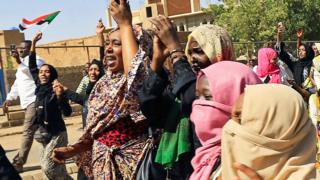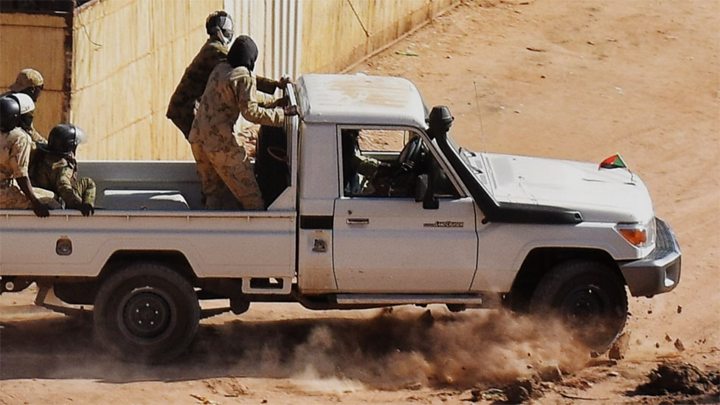How ‘cheating husbands’ are linked to Sudan protests
In our series of letters from African journalists, Zeinab Mohammed Salih explores how women in Sudan are using a Facebook group about love to expose alleged abuse amid anti-government protests.
Unprecedented numbers of women are taking to the streets to join daily nationwide protests that erupted in mid-December.
Despite a violent crackdown by the security forces and reports of sexual harassment, they remain undeterred.
More than 50 people are thought to have died at the hands of security agents and many have been tortured, rights groups say.
Yet women make up 70% of marchers at some protests, observers say, defiant in the face of the repressive laws of the conservative, Islamic state.
They all wear headscarves in compliance with the country’s Public Order Act, which regulates what women should wear – they can, for example, be flogged for wearing clothes such as trousers that are considered indecent.
Hair cut with razorblades
But a 23-year-old graduate told me how her headscarf was ripped off when she was detained on 31 January by security agents at a protest in the capital, Khartoum.
“They cut the bun off my head with a razorblade and they threatened me with rape when I was taken in their truck from downtown Khartoum,” Jode Tariq said.
A 24-year-old related a similar incident in Khartoum earlier in January.
“They cut my hair along with another woman at an unknown location used as a detention centre,” Afraa Turky said.
Female journalists Shamael al-Nnoor and Durra Gambo, who were both arrested for covering the protests over the last month, said some young women they met while in custody told them they had been sexually abused by security agents.
And dozens of other women thrown into jail have not been heard from since their detention.
Sudan’s Public Order laws
But women are fighting back against these alleged abuses using a private all-women Facebook group that was set up three years ago to identify cheating husbands and follow their crushes.
Sudan’s powerful National Intelligence and Security Service (NISS) is behind the brutal response to the demonstrations that started in the eastern city of Atbara initially in response to a hike in bread prices.
Now photos taken at protests of suspected NISS agents are shared in the group, called Minbar-Shat, which in Sudanese Arabic means “Extreme Love”.
If anyone is able to identify or knows anything about them – they share these details, sometimes even giving names, addresses and phone numbers. This has led to some protesters writing graffiti on houses saying a known NISS agent lives there.
‘Don’t look at me’
The Sudanese authorities have tried to block social media in the country, but the women bypass the blockade by using Virtual Private Networks (VPN), which can hide a user’s location.
So successful has the strategy been that NISS agents have started to wear face masks in an effort to avoid identification and ostracisation.
Some protesters have told me that when they were arrested they were forced to look down towards the ground for hours.
One said, “I was beaten on my head with a stick because I accidentally looked up and he told me, ‘Do you want to take my pictures to Minbar-Shat? Don’t look at me.'”
The protesters themselves also have to wear masks but for different reasons.
You may also be interested in:
They get them from pharmacies to avoid the bad smelling tear gas usually thrown at them during the protests.
Minbar-Shat is now active in posting on Toyota’s Facebook page informing the company about the use of their cars in Sudan by NISS members to arrest and sometimes run over protesters.
U-turn over dress laws?
Sudan’s poor record on women’s rights is well documented, with Human Rights Watch saying the security forces have often used sexual violence and intimidation to silence women.
Ten days ago a group of women were raped by a government militia at a camp for internally displaced people in northern Darfur, where the UN says rape has been used as a weapon of war during the conflict that began more 13 years ago to demand greater political and economic rights for communities in the region.
According to the No To Women Oppression group, thousands of women get arrested and flogged each year by the police for wearing indecent clothes or simply for being out with men.
Interestingly, President Omar al-Bashir, who has led a hardline administration since coming to power in an Islamist-backed coup in 1989, has softened his language about the Public Order laws.
The 75-year-old sees their harsh implementation as the reason for the protests and says they are too strict an interpretation of Sharia.
This is indeed a turnaround as he defended the law vociferously in 2010 when there was an outcry over a video on social media showing a woman screaming as she was whipped for wearing trousers.
But his words, spoken during a recent meeting with newspaper editors, seem unlikely to be able to douse the flames.
Ms Tariq and Ms Turky, who both had their hair cut by agents last month, insist they will not stop protesting until Mr Bashir leaves office.
More Letters from Africa:
Follow us on Twitter @BBCAfrica, on Facebook at BBC Africa or on Instagram at bbcafrica
Source: Read Full Article




